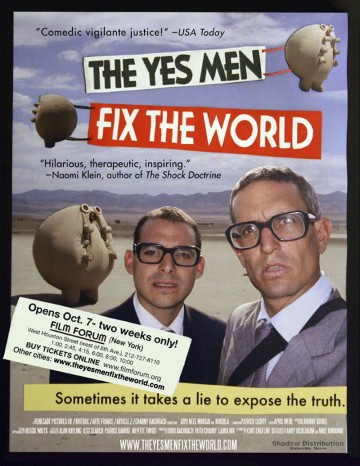
Originally published in the Northside San Francisco in July 2010
In late 2008, 100,000 copies of a special edition of the New York Times hit the streets of New York City. Strangely future dated to July 4, 2009, the headline read “Iraq War Ends”. The special edition featured additional stories like “Maximum Wage Law Succeeds,” “Nationalized Oil to Fund Climate Change Efforts” and “Nation Sets Its Sights On Building Sane Economy.” Too good to be true? Apparently so. The paper was a hoax orchestrated by two men called Andy and Mike, otherwise known as The Yes Men.
The Yes Men are focused on what they call “Identity Correction”, an activity described on their website as: “Impersonating big-time criminals in order to publicly humiliate them. Our targets are leaders and big corporations who put profits ahead of everything else.”
That is exactly what they do, often with hilarious results. In “The Yes Men Fix The World”, now out on DVD, Andy and Mike take on the identities of corporate leadership from Dow Chemical, Exxon Mobil and Halliburton with the single minded goal of doing the right thing; promoting the value of human life and planetary health over profit. Because, after all, profit isn’t everything, right?
Disguised as a corporate do-gooder, Andy (mis)represented Dow Chemical when BBC World Television contacted the Yes Men’s fake website, “Dow Ethics”, and invited them to take part in a news story in remembrance of the 20th anniversary of the Bhopal disaster. In 1984, Union Carbide’s pesticide plant exploded in Bhopal, India killing thousands of people, contaminating countless others and creating the worst industrial accident of all time. In front of a global audience of 300 million people, Andy went on BBC World Television under the pseudonym “Jude Finisterra” and said that Dow, who had recently acquired Union Carbide, intended to liquidate the 12 billion dollar company to compensate the victims of Bhopal and clean up the existing contamination that still plagues the area. Yes, the stockholders will make a little less money, but this is the right thing to do, he claimed.
After the broadcast, Dow Chemical’s stock dropped causing a loss of over 2 billion dollars in twenty three minutes. No spoilers here. The meat of the film’s story involves what happens after the world discovers that Dow never intended to do this at all, forcing everyone to ask the natural question: Why wouldn’t a corporation take a slight hit in profits to correct the worst industrial accident of all time? The BBC invited the Yes Men, now as themselves, back on the news program later that day to discuss the hoax. They explained that it was not so much a hoax as “… an honest representation of what Dow should be doing”.
The Yes Men compare the present state of the economy to the Jonestown Massacre, suggesting that companies and government leaders have for years ingested the “free market kool-aid”. They blame deregulation and the motive of profit for what they describe as greed dressed up as progress. This idea becomes personified in Gilda, the golden skeleton of acceptable loss, a symbol the Yes Men created when impersonating Dow Chemical at an international finance conference. The Yes Men, again posing as Dow representatives, explain to a surprisingly agreeable audience of business executives that loss of life is acceptable when profits are high, and they even sing a little song about it.
With plenty of comic relief to help the medicine go down, the Yes Men somehow bring humor to subjects that aren’t really funny at all. If only we could wake up tomorrow morning, read the papers and discover that the oil spill disaster in the Gulf was just a hoax. Near the end of the film, Mike defends their fake New York Times special edition by pointing out that if a few people at the top create all the bad news, why can’t all of the people, the rest of us, turn it around and create good news? The Yes Men’s antics prove that individuals still have the power to make a difference in shaping human destiny. And we can laugh.